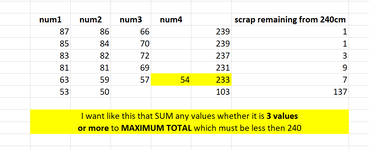shersalafi
New Member
- Joined
- Dec 24, 2021
- Messages
- 4
- Office Version
- 365
- 2010
- Platform
- Windows
Hi, to every one.
I am creating a report. i have a list of different numbers in range M4:M21
What i need is to sum up any 3 or 4 values that can near to 240 but not more than that
For Example I have This List
Range M4 to M21
Now i need Any Combination of 3 values or 4 values which sums the maximum number but should be less than 240.
Like in Above List 86 + 84 + 69 = 239
Then 63 + 82 + 87 = 232
It should give me Like That but not more than 240
and the cells which are used should not be used again like Cell M16 (i.e. 86) , M19, M18 is used in one combination so it should not be used again.
And 3 or four values which is used should be coloured differently.
if there is any macro you can suggest
Thanks for you support in advance.
I am creating a report. i have a list of different numbers in range M4:M21
What i need is to sum up any 3 or 4 values that can near to 240 but not more than that
For Example I have This List
Range M4 to M21
| 57 |
| 81 |
| 87 |
| 50 |
| 85 |
| 66 |
| 70 |
| 72 |
| 81 |
| 54 |
| 82 |
| 59 |
| 86 |
| 53 |
| 69 |
| 84 |
| 63 |
| 83 |
Now i need Any Combination of 3 values or 4 values which sums the maximum number but should be less than 240.
Like in Above List 86 + 84 + 69 = 239
Then 63 + 82 + 87 = 232
It should give me Like That but not more than 240
and the cells which are used should not be used again like Cell M16 (i.e. 86) , M19, M18 is used in one combination so it should not be used again.
And 3 or four values which is used should be coloured differently.
if there is any macro you can suggest
Thanks for you support in advance.






